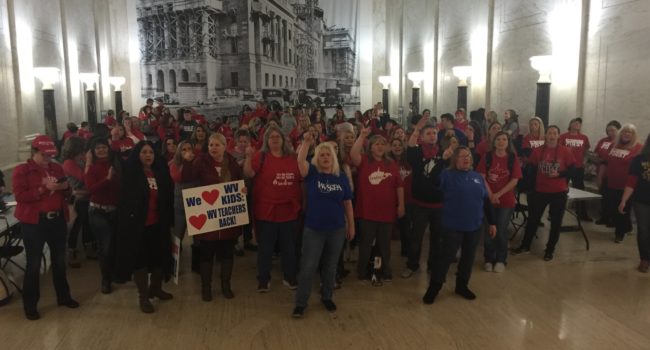CHARLESTON — Lawmakers with a new mission of mingling with teachers, students and parents for Gov. Jim Justice’s special session on education are already making plans.
What remains unknown is the degree of consensus when legislators return to vote on an education agenda. Right now, no one knows what those bills would be, except for the probable inclusion of a pay raise for teachers and school service personnel.
“I think it’s a decent plan for the total disaster this has been this session,” said Sen. Corey Palumbo, D-Kanawha. “Rather than working with the teacher groups, rather than working with the Democratic colleagues they have, they tried to ram something through without bringing other people to the table, and it blew up in their face.
“We’ve got to salvage this, and this is probably the best way to salvage it. But let’s be honest, we shouldn’t be in this situation.”
Palumbo, speaking on MetroNews’ “Talkline,” was referring to an omnibus education bill that sparked a two-day teacher strike.
Earlier in the session, the Senate majority tied a pay raise to a variety of other changes to the state education system, including charter schools and education savings accounts, which provide tax dollars for students moving from public education to private schooling.
Justice pushed for the standalone teacher pay raise he promised in October.
On Wednesday night, Justice announced a special session to deal with the pay raise and other changes to West Virginia’s education system.
The plan calls for the special session to start right after the regular legislative session concludes. But lawmakers will recess right away, with a mission declared by Justice to talk with people affected by the state’s public schools.
In a few months, lawmakers will return to Charleston to vote on still-to-be-determined changes to the school system.
“I think it’s a decent plan,” said Sen. Ron Stollings, D-Boone. “Seems like the Senate majority is dug in pretty hard on not giving a pay raise without trading off for charter schools and education savings accounts, so I think it’s a decent plan.”
Senate President Mitch Carmichael, R-Jackson, said his caucus remains committed to a pay raise — but with significant changes to the education system.
“We will be insistent that there are reforms in this system in West Virginia that is not currently serving the needs of our students,” Carmichael said on “Talkline.”
Carmichael said he would like to see charter schools be considered in special session.
“I think charter schools should be in there, but I can’t guarantee it,” he said.
Delegate John Mandt, R-Cabell, said he’s already made arrangements to meet with his county’s superintendent. That’s a first step that will branch out into gatherings with teachers and others.
“I’m looking forward to it, actually,” Mandt said in a Capitol hallway.
He’s interested in examining class sizes and curriculum improvements.
“My goal would be to make our public education in West Virginia the best it can be,” he said. “When people move into your area and they have kids, what’s one of the first things they ask: How are your school systems? What are your school systems like?”
Delegate Jason Barrett, D-Berkeley, said taking a little time away from the Capitol is a good move.
“I think it’s foolish to come down here without an agreement at $35,000 a day to the taxpayers. I think it’s also important that we take a little break. Tensions are really high at the Capitol right now. I think everybody just needs to go home and cool off a little bit, get an agreement and do what’s right for the people of West Virginia.”
Barrett believes charter schools and education savings accounts will be back in the discussion.
“We’re still going to have these battles, I believe, over ESAs and charter schools,” he said. “I think the Senate is at least going to draw a line in the sand about charter schools.”
Delegate Mick Bates, D-Raleigh, suggested the special session means avoiding difficult financial decisions as legislators vote on a state budget over the next couple of days. Bates is the top-ranked Democrat on the House Finance committee.
The regular session ends at midnight Saturday.
The pay raise amounts to $67 million. The other changes in the omnibus education bill added up to $180 million.
“If we’re going to do education reform, you’ve got to pay for education reform,” Bates said.
Echoing some of the governor’s words, Bates continued, “Education betterment requires dollars. And we’re about to pass a budget out of here without the dollars for the betterment.”
West Virginia’s teacher union leaders applauded the call for lawmakers to acquaint themselves with classrooms. But they indicated their groups will remain resistant to charter schools and education savings accounts.
“If they truly do what they say they’re going to do — to go out and listen to the experts — then they will hear things like we need to lower class size, we need the additional support personnel,” said Dale Lee, president of the West Virginia Education Association.
He encouraged educators and parents across the state get involved in the conversations, predicting that would lead to charter schools being left out.
“If they are listening to the people out there, if they are listening to experts, you won’t have that (charter schools) as part of the educational reform transformation,” Lee said.
Fred Albert, president of the American Federation of Teachers-West Virginia, believes lawmakers won’t hear much demand for charter schools.
“I say, where has the public outcry been for charter schools? It hasn’t been in this state,” Albert said.
Albert expressed disappointment that a special session has even become necessary.
“It’s disappointing this pay raise was not taken care of during the regular session like was promised by the governor,” he said.




